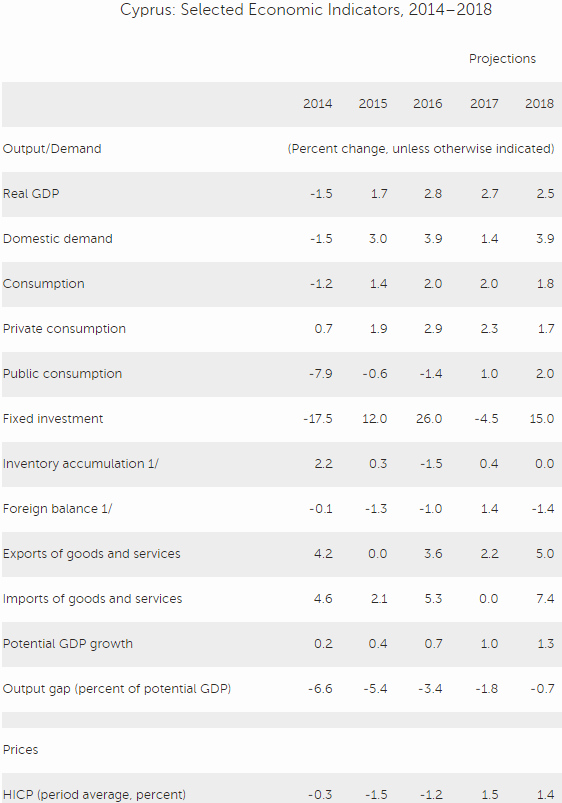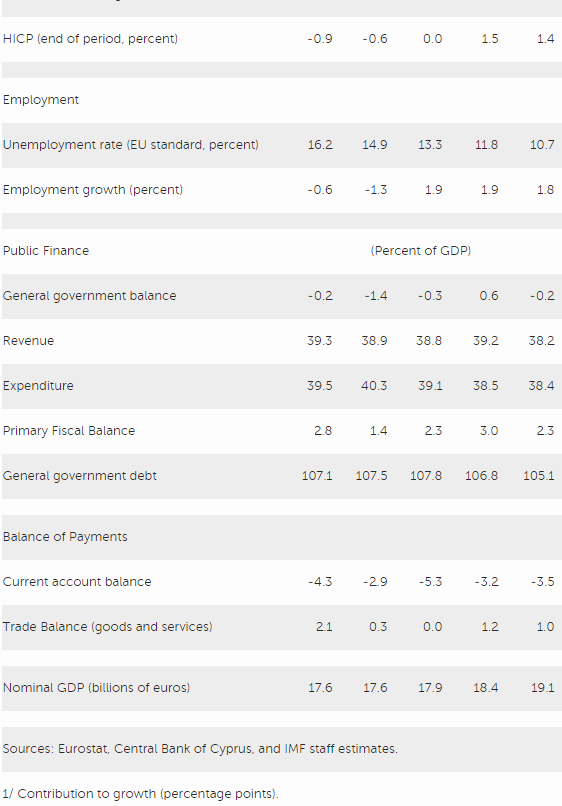IMF Executive Board Concludes First Post-Program Monitoring Discussion with Cyprus
On June 7, 2017, the Executive Board of the International Monetary Fund (IMF) concluded the first Post-Program Monitoring Discussion with Cyprus.
Cyprus’s economic recovery has continued to strengthen in the 15 months since it exited from the Fund-supported program. Economic growth has been broad-based and reached a robust 2.8 percent in 2016, supporting a sharp drop in the unemployment rate. Excluding large one-off imports, the current account deficit continued to narrow and earlier gains in price competitiveness have been preserved. The fiscal primary surplus reached a sizable 2.3 percent of GDP (on a cash basis) in 2016, supported by reforms undertaken in previous years and improving cyclical conditions, and the cost of market-based borrowing by the sovereign has fallen considerably. The restructuring of nonperforming loans has also gained momentum. Still, the clean-up of private and public sector balance sheets is progressing slowly, and indebtedness remains very large.
Over the medium term, the pace of growth is expected to gradually ease to just over 2 percent, due mainly to two factors: an expected pickup in private sector debt servicing and rebuilding of savings buffers, which will trim consumption growth; and gradual dissipation of the current ongoing surge in investment. Coupled with write-down of debt, the stepped-up debt servicing will gradually restore private indebtedness to a more sustainable level and improve the banking sector’s financial health. The fiscal primary surplus is expected to reach 3 percent of GDP in 2017 and moderate to 2½ percent of GDP during 2018–22, helping to lower public debt net of cash holdings to just over 80 percent of GDP by 2022.
Executive Board Assessment
Executive Directors welcomed Cyprus’s notable economic achievements since exiting the Fund-supported program in early 2016, including strengthening output and employment growth, sizable primary fiscal surpluses, and an ongoing gradual healing of the banking system. Nonetheless, these achievements have not yet resulted in significant reductions in the high levels of private-sector debt, nonperforming loans, and general government liabilities. Directors, therefore, urged the authorities to build on their efforts.
Directors noted that Cyprus’s capacity to repay the Fund is satisfactory but subject to risks. Sustained moderate GDP growth and primary fiscal surpluses are expected to underpin repayment capacity, supported by a backloaded maturity profile of official debt and continued access to capital markets on favorable terms. Directors welcomed the authorities’ intention to repay early part of Fund credit, which would further reduce debt servicing cost. Nonetheless, to safeguard repayment ability in the event of volatile economic growth and financial shocks, Directors urged more ambitious policies to increase policy buffers and reduce private and public sector debt.
Directors recommended measures to accelerate the downward paths of nonperforming loans and private sector leverage to strengthen the efficiency of credit allocation, eliminate debt overhangs, protect the adequacy of banks’ capital, and improve the payment culture. Directors advised formulating tools that incentivize banks to offer sustainable loan workout packages to viable debtors and increase reliance on third-party debt servicers, while also streamlining court procedures for claims settlement and ensuring that regulations encourage timely recognition of losses.
Directors called for further efforts to curb public debt to create fiscal headroom and insulate the downward path of public debt from potential shocks. This could be achieved by saving overperformance and windfall revenues and restarting stalled privatizations. A few Directors cautioned, however, that additional fiscal effort could hinder the economic recovery. Directors noted that allocating additional resources to growth-enhancing public investment and implementing structural fiscal reforms to avoid expenditure slippages and unfunded tax cuts are also essential to bring down public debt. Directors welcomed the authorities’ commitment to ensure that healthcare, public sector wage bill, and public sector pension reforms do not pose risks to fiscal sustainability.
Directors encouraged the authorities to restart macro-critical structural reforms to enhance competition and encourage broad-based investment and economic growth. Directors recommend establishing a dedicated commercial court, strengthening enforcement of commercial claims, and reviving the privatization program.


Source: World Bank
- 234 reads
Human Rights
Ringing FOWPAL’s Peace Bell for the World:Nobel Peace Prize Laureates’ Visions and Actions

Protecting the World’s Cultural Diversity for a Sustainable Future

The Peace Bell Resonates at the 27th Eurasian Economic Summit

Declaration of World Day of the Power of Hope Endorsed by People in 158 Nations

Puppet Show I International Friendship Day 2020

